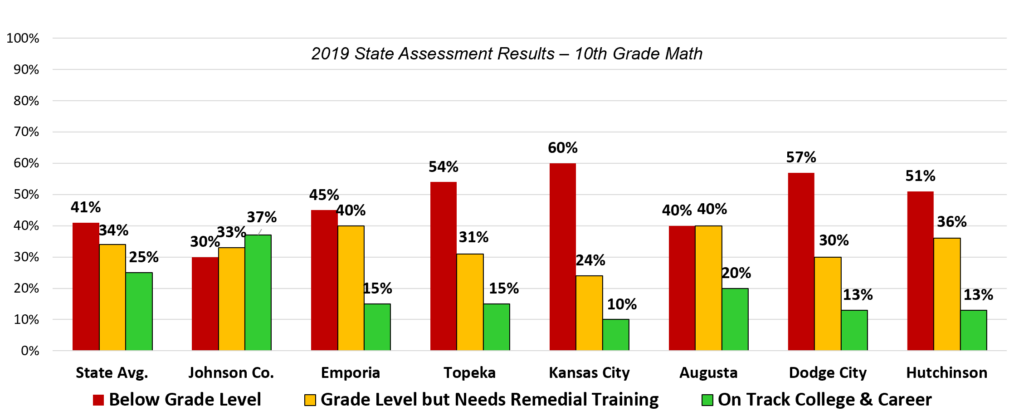Recent high school graduates set aside plans to attend technical school, community college, and university last year, slowing entry to the workforce. Now school and state officials wonder whether they’ll return to career preparation once the pandemic is over.
Randy Watson, Kansas Department of Education commissioner, told members of the state board of education that enrollment in Kansas Regents schools dipped by 4% last year, and enrollment by Kansas students in Regents schools fell by 6%. Enrollment in Kansas private colleges also dropped by 6%, and the number of Kansas students attending private colleges in-state floundered. In-state enrollment at private schools dipped by 21%. If the trend continues, he worries that Kansas will have an undereducated workforce in the future.
“Will these kids come back? I don’t know that answer. We know generally what happens. Kid says I’m going to take a year off. They don’t come back. The odds of coming back are not good,” Watson said.
Watson said the low numbers likely reflect a response to the pandemic. Nationwide, large swaths of recent high school graduates reported changing their post-graduation plans due to the coronavirus.
Lower-income students likely to change career plans during pandemic
Students from lower-income families delayed post-secondary training or schooling at a greater clip than those with higher incomes, Watson said.
Nationally, 77% of students from families earning between $25,000 and $34,999 changed enrollment plans in fall 2020. Forty-two percent canceled plans to attend post-secondary training altogether. Kids from wealthier families also changed post-high school plans, Watson said. For instance, 70% of kids from families earning between $100,000 and $149,999 changed their plans, and 30% canceled their enrollment.
Students who planned to attend technical and career programs were more likely to adjust their plans than students planning to attend college or graduate school. According to Watson, 54% of students planning to attend a certificate program scrapped plans to enroll last year. Only 44% of students attending associate’s degree programs canceled their enrollment, and 25% of those intending to enroll in bachelor’s degree programs dropped out.
“We’re seeing a gap from those going on to four-year college and those going on to associate degrees,” Watson said. “And it’s stark. Over half of the kids going to the certificate program didn’t go.”
Officials wonder will high school grads enroll in college, tech training?
Michelle Dombrosky represents parts of Johnson and Miami counties on the state board of education. She said she talked to people who enrolled in technical programs, but delayed attending due to costs and the decreased value of the education they would receive in remote learning. Many of the programs, she explained, require hands-on training.
“I think they will probably come back as long as they can get back on track and do lab work and not just look at videos,” she said.
Watson agreed but worried whether they would return.
“Traditionally, in non-pandemic times, they don’t come back,” he said.
Alan Cobb, president of the Kansas Chamber, said the pandemic exacerbated an existing problem.
“Pre-COVID workforce quantity and quality was an issue, and it’s going to continue to be,” Cobb said.
However, he said there’s a growing consensus that schools and industry work to align workforce needs with educational programs.
“There’s no silver bullet, but there are couple of things in the works,” he said. For instance, state lawmakers are considering the Promise Scholarship Act, a proposal that creates scholarships for some two-year associate programs. And Gov. Laura Kelly is set to issue an executive order creating the Advanced Coordinating Council. The EO formalizes a process for industry officials and education shareholders like the Kansas Board of Regents to work together on matching training with industry needs.
Whether the coordinating council works on a growing gap due to COVID will depend on what the class of 2021 does and whether the class of 2020 returns to education programs in the fall.
Alarming signs suggest fewer students intend to enroll in post-secondary training or education programs next year, Watson said. When students decide to enroll in college, their families typically fill out the FAFSA, or the Free Application for Federal Student Aid.
“Here’s what scares us. FAFSA completions for the class of ‘21 are off 19% from a year ago,” Watson said. “…If people come back, we’re OK. If they don’t, we’re going to have an undereducated workforce for Kansas.”
Dave Trabert, CEO of Kansas Policy Institute (which owns the Sentinel), says Kansas already has an undereducated workforce.
“State assessment results show there are more 10th-graders below grade level than are on track for college and career in math. Statewide, 41% are below grade level, 34% are at grade level but still need remedial training, and only 25% are on track. 
“Even in Johnson County, 30% of 10th-graders are below grade level. Results for English Language Arts are similar. Enrollment in post-secondary options is important but the State Board and local districts should focus on getting kids at least to grade level in high school. Kansas already has an undereducated workforce but they don’t want to talk about that sad reality.”



